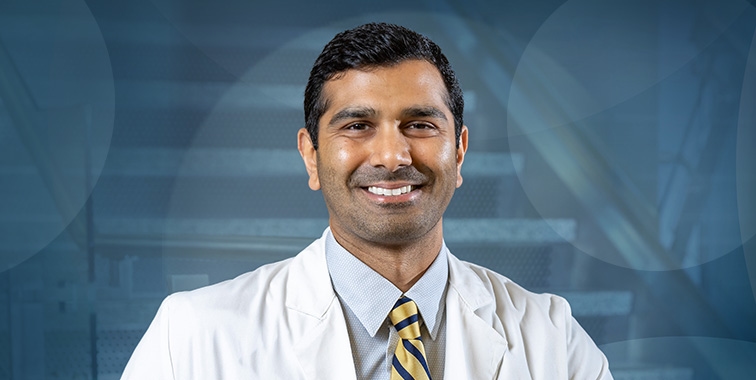Thyroid: The Engine That Drives The Body
- Category: Community Newsletter, Patient Stories
- Posted On:
- Written By: Kay Kearney

Tysha Martin was in a vicious cycle – she was depressed because she was fat and fat because she was depressed.
At least that’s how she saw herself. Martin, 49, had had eight back surgeries and never been overweight. But, despite an exercise routine and diets, she gained more than 45 pounds in a seven month period.
“I asked myself, ‘Why is this happening to me?’ I felt so defeated; I didn’t feel like myself,” she remembers.
Her primary care doctor suggested something might be amiss with her thyroid. So when she learned that Dr. A. Mannan Khan had recently joined North Oaks Endocrinology, she made an appointment to see if her thyroid could be causing her problems.
Dr. Khan and his partner, Dr. Corey Majors, help diagnose, manage and treat thyroid conditions such as hypothyroidism, hyperthyroidism, Hashimoto’s disease, goiter, Graves’ disease, thyroid cancer and nodules.
During Martin’s first visit, Dr. Khan guided her through a maze of questions and concerns she had about the butterfly-shaped gland in the front of her neck.
“I didn’t realize what the thyroid controlled,” she recalls. "Dr. Khan educated me and didn’t leave any stone unturned.”
The thyroid – the engine that drives the body – controls the speed of metabolism. Thyroid disorders can slow down or rev up metabolism by disrupting the production of thyroid hormones.
The thyroid creates two thyroid hormones, triiodothyronine (T3) and thyroxine (T4). In addition to regulating metabolism, the thyroid can also affect the following functions: heart rate; body temperature; muscle strength; body weight; menstrual cycles; nervous systems; and cholesterol levels.
After reviewing Martin’s medical history during a “lengthy conversation,” Dr. Khan diagnosed her with hypothyroidism, a condition in which the thyroid gland doesn’t make enough hormones to keep the body running normally. About 4.6% of Americans age 12 years and above suffer from hypothyroidism.
“The conversation was about me,” Martin shares. “My appointment wasn’t rushed, and he was very compassionate. It was very customized – like meeting with a tailor who was making a dress just for me.”
Dr. Khan, himself a thyroid cancer survivor, explained to Martin that many are surprised when they are diagnosed with a thyroid condition. And, there are often thyroid disease symptoms that are overlooked and untreated.
In addition to weight gain, Martin’s symptoms included fatigue and mood swings. She confesses that she often lacked the energy and interest in familiar and favorite activities, like taking road trips with her husband Harold in their Corvette.
After a thorough evaluation, Dr. Khan was able to regulate Martin’s medication and to assist with her nutritional needs – always encouraging her and providing positive reinforcement.
“Dr. Khan assured me that the way I was reacting was normal and told me to quit beating myself up for feeling the way I did,” she adds.
She has since lost 25 pounds and has control over her emotions. She sees Dr. Khan every three months to manage the hypothyroidism and to stay on track with his support.
“The collaboration between Mrs. Martin and myself is paying off – she has had an excellent outcome for her disease process,” Dr. Khan notes. “Through following up regularly with labs and office visits, it is now well controlled.” Martin credits Dr. Khan for the successful changes in her lifestyle.
“Dr. Khan is not just a doctor. He’s a partner in my journey,” she concedes. “He’s given me the tools to keep going and to be empowered. I feel like myself again, and I am comforted knowing Dr. Khan will be there to help me navigate any changes on my journey.”
Watch Tysha tell her story in this brief video.
If you believe you may have a thyroid problem, schedule an appointment today with Dr. Khan or Dr. Majors. Hammond: (985) 256-4219; Livingston: (844) 619-0726; online: www.northoaks.org/thyroidcare




[1].jpg)